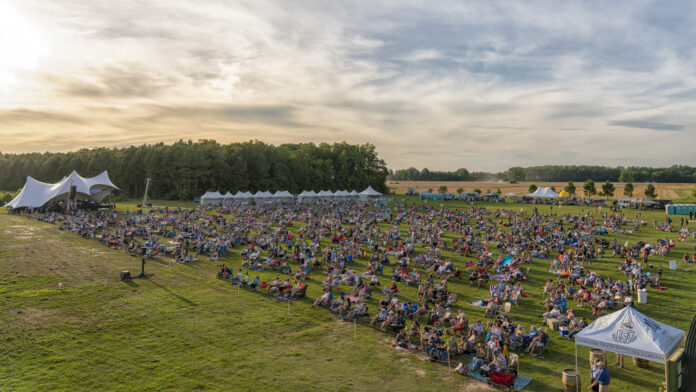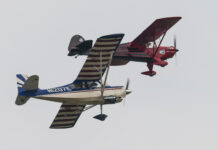By: Collin Callahan
March 10, 2020 may be remembered as the last “normal” day in the United States before COVID-19. The next day, as the Utah Jazz and Oklahoma City Thunder were preparing to play, one of the basketball players tested positive for COVID-19. The game was cancelled, shortly followed by the remainder of the NBA season.
In the days that ensued, sporting events, concerts, conventions, church services, theater performances, air shows — anything that draws a crowd — were cancelled.
Air show organizers will be faced with several difficult questions during the coming weeks and months. Adding to the challenge is lack of predictability in the ever-changing, unprecedented situation. While there is hope that social distancing measures will end this summer, epidemiologists have warned that there may be additional waves of COVID-19 infections until a vaccine is developed.
CANCEL, RESCHEDULE OR CARRY ON?
For event organizers in many states, the decision on whether to cancel events wasn’t a decision at all. In March, the Centers for Disease Control and Prevention in the United States recommended that all events with ten or more people should be cancelled. Most states ordered residents to stay at home except for essential outings.
It’s unclear just how long these stay-home orders will be in effect, but more than six dozen shows in North America have already cancelled.
And unlike the Sequestration debacle of 2013 that principally impacted the air show business, virtually all large spectator events have either already been cancelled or are tracking the virus closely to see how it might impact their plans for later this year. From the Burning Man festival, Tony Awards, Boston Marathon and 2020 Summer Olympic Games in Tokyo to the Cannes International Film Festival, Kentucky Derby, Rolling Stones’ 2020 North American tour and St. Patrick’s Day parades all over the world, most of the world has abided by warnings from public health officials to avoid large gatherings of people.
Similarly, the Tour de France, the month-long, 2,000+ mile bicycle race which had been slated to start on June 27, announced that it was postponing the event until later this summer/fall (August 29-September 30). But there are some who doubt that the postponed and rescheduled event will take place this year at all.
Whether cancelling, postponing, or rescheduling, communication with stakeholders is key.
“The truth is that everything is up in the air right now, and we don’t know what’s going to happen with events this summer,” said Lauren McCue, an events manager at a non-profit organization. “Right now, we’re just making sure that we’re in close communication with our partners and our event attendees so that they know how we’re approaching the situation.”
Even when it’s unclear what the final decision will be, air shows will likely find it beneficial to let performers, volunteers, fans, and sponsors know how and when a go/no go decision will be made.
Still, there is optimism that events in late summer and early fall might be able to continue as planned. President Trump said he hopes football stadiums will be full when the professional football season kicks off. The Masters golf tournament was bumped to the fall. Other large events in the fall are paying close attention to the many variables that will impact whether or not they can move ahead with their events as planned.
WHAT SHOULD BE DONE ABOUT TICKETS ALREADY SOLD?
When events are canceled, organizers must consider how to handle existing ticket holders.
In some cases, events were able to delay ticket sales until a decision about the event was made. The Hangar 24 SBD AirFest in San Bernardino, California, was prepared to launch ticket sales on March 13. That morning, organizers made the decision to postpone sales, and they announced on March 17 that the event scheduled for the end of May wouldn’t take place in 2020.
Across the U.S., though, hundreds of events had already sold tickets and were prepared to welcome crowds. One of the most prominent was South by Southwest (SXSW). The annual festival and convention can bring in nearly a half-million people over ten days in Austin, Texas. But, just a week before it was set to begin, the event was canceled.
“We’ve learned that if there’s anything more difficult than producing an event the magnitude of SXSW, it’s canceling one,” Linda Park, director of communications for SXSW, said in a blog post. “This is a devastating time for the company, for our staff and for our community of artists, educators, musicians, filmmakers and small businesses that support this annual event.”
SXSW has a strict no-refund policy for tickets. However, a week after the cancellation, it announced that ticket holders could transfer their 2020 tickets to either 2021, 2022 or 2023.
Sporting events and concerts have told fans to hold onto their tickets for the time being. But that’s left customers in limbo, with more than $1 billion tied up in already-purchased tickets, according to USA Today. Until events are officially cancelled, attendees can’t get refunds from major ticket processors, like Ticketmaster and Eventbrite, a point of strife for fans.
“No matter how air shows choose to proceed with ticket holders, it’s important to remember that those who purchased tickets well in advance of the show are some of the most loyal members of your fan base,” said ICAS president John Cudahy. “Whether you issue refunds or transfer the tickets to a different date, communicate that information clearly and delicately.”
WHAT ABOUT SPONSORS?
Another consideration for organizers is how to handle event sponsors.
Major brands that sponsor major events have so far stood by those sponsorships. When the Olympics were postponed to 2021, Visa and Coca-Cola both said they would continue with their sponsorship. In part, that’s due to the effort already expended on marketing campaigns. But it’s also due to the fact that companies sponsor events because people attend those events.
In a post-coronavirus events world, the value proposition for sponsors will largely be the same: a chance to get their brand in front of potential customers. As people return to events, sponsors should follow suit. Some sponsorship experts believe that events will be even more popular when pandemic-related restrictions are eased and people start to gather again.
Like other events, air shows need to approach sponsors now and ensure that there is an open-line of communication.
“If you have existing sponsors, call those sponsors and tell them what’s going on,” said Linda Hollander, CEO of Sponsor Concierge. She encourages organizers to reschedule their events rather than cancelling them outright and to ensure that sponsors see value beyond the air show weekend.
“Don’t just make it about signage at the event; make it about what happens when the show isn’t on,” she said. “If you do sponsorships as a yearly program that is not so event-focused — if you send out emails, videos, social media posts, and other things that are engagement pieces for your sponsors — they will not ask for a refund.”
What may be the biggest factor for sponsors is the economic impact from stay-at-home orders. As the effects of shut downs ripple through the economy, it’s possible that certain businesses may not have the same access to capital for marketing that they did before. But other companies may turn to events as an opportunity to remind customers that they are open for business and ready to serve the community. And, based on the experience of the air show business in 2008 at the height of the great recession, it’s possible that air shows will see a spike in attendance as the public looks for inexpensive, close-to-home entertainment options as they manage the financial impact of the pandemic on family finances.
EVEN WITHOUT AIR SHOWS, AN OPPORTUNITY FOR ENGAGEMENT
With millions of Americans under stay-at-home orders, demand for digital content has skyrocketed. As with other social media platforms, Facebook usage has surged. As people look for a reprieve from the news cycle, they are turning toward different entertainment options.
Air shows, as well as performers, can take advantage of this and share content on social media for fans to interact with. Doing so should allow air shows to maintain the connections that they have with fans and make sure that when people can attend events in person again, air shows are a much-anticipated entertainment option.








